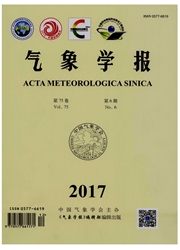

 中文摘要:
中文摘要:
在政府间气候变化委员会(IPCC)排放情景特别报告(SRES)的A2情景下,利用CSIROMark3海气耦合模式模拟现代和未来2个10年的模拟结果,驱动MM5区域气候模式进行中国未来区域气候变化的数值模拟试验,研究了IPCCA2情景下未来中国温度、降水和环流等的变化趋势。结果表明,(1)区域气候模式MM5V3能够再现气候平均环流、降水和温度分布的主要特征,具有较好的区域气候变化模拟能力;(2)IPCCA2情景下,未来中国平均地面气温将有明显的升高,特别是中国的东北、西北和西南地区增幅超过了1℃。冬季,地面平均气温的增幅由南至北逐渐增加;夏季,在内蒙和中国西南地区有明显的增温。伴随温度的升高,降水也有明显的变化,年平均降水在中国的东北地区、江淮流域及以南大部分地区都有明显的增强,而中国华北部分地区及西南、西北大部分地区降水将呈减少趋势。不同季节不同地区的降水变化也不同,秋季华北、华南和江淮地区降水都增加,而冬季减少。降水的年内变化也有所增强。
 英文摘要:
英文摘要:
Regional climate change in China under the IPCC A2 scenario was simulated for a 10-year period by MM5V3, using the output of an IPCC A2 run from CISRO Mark 3 climate system model as lateral and surface boundary conditions. The regional climate change of surface air temperature, precipitation, and circulation were analyzed. The results show that the distribution of mean circulation, surface air temperature, and precipitation were reproduced by MMSV3. The regional climate model was capable to improve the regional climate simulation driven by GCM. The climate change simulation under the IPCC A2 scenario indicates that future surface air temperature in China would increase, with a stronger trend in winter and a south-north increasing gradient. Surface air temperature would increase more than 1 ℃over Northeast and Northwest China, whereas climate change would distinctly alter precipitation distribution. Annual mean precipitation would remarkably increase in Northeast China, Yangtze-Huaihe River Valley and the south area of the Valley, while rainfall would appear a decreasing trend in partial areas of North China and many regions of Southwest and Northwest China. The precipitation simulation show different changes in different seasons and regions. Future climate change indicates an increase of precipitation over North and South China, and Yangtze-Huaihe regions, precipitation in autumn and a decrease in winter.
 同期刊论文项目
同期刊论文项目
 同项目期刊论文
同项目期刊论文
 期刊信息
期刊信息
